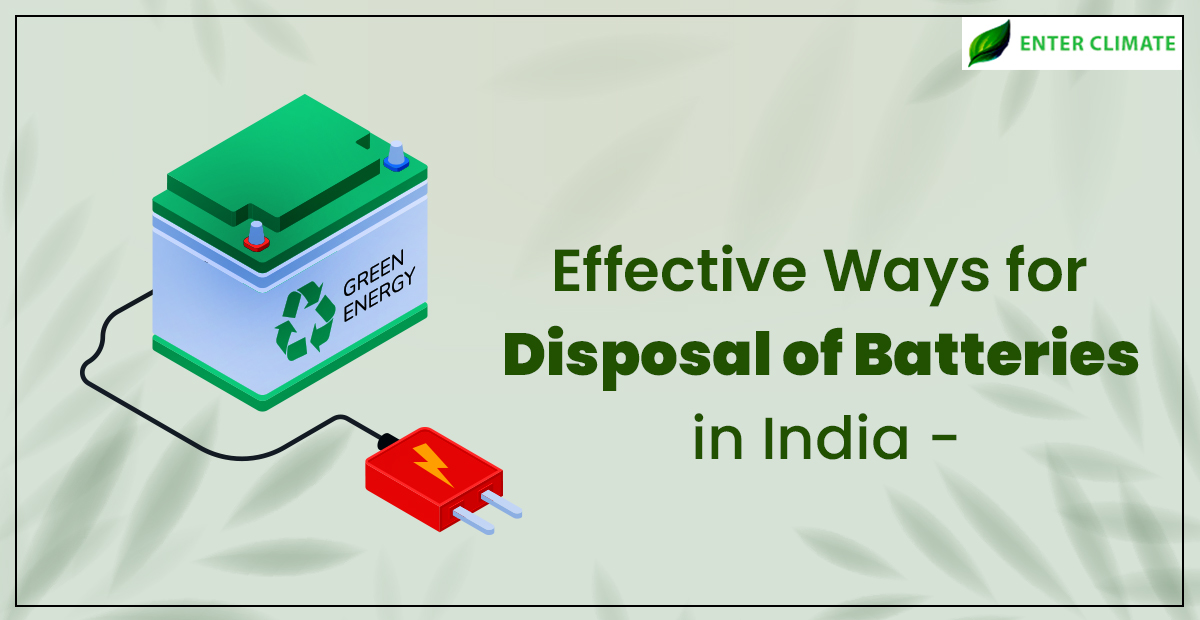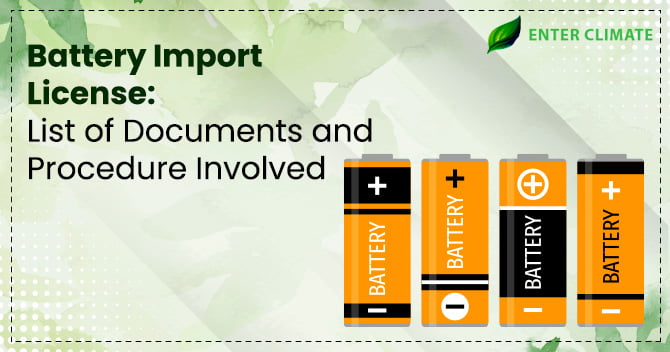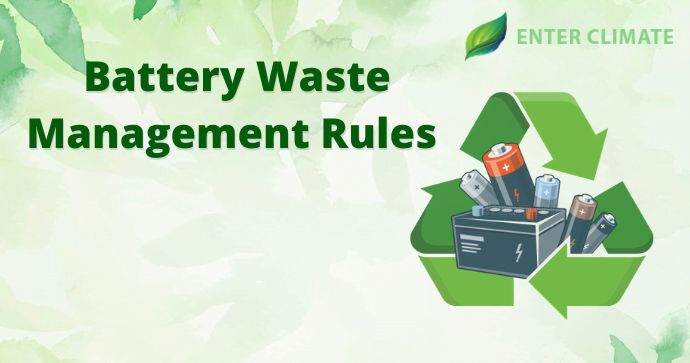Effective Ways for Disposal of Batteries in India
 19 Sep, 2023
19 Sep, 2023 
With a resilient discussion about safe environmental practices worldwide, we are now quite aware of the harmful effects of poisonous and hazardous substances in the environment. When these substances interact with our food, water, or air, the risk of a myriad of diseases runs high. While a lot of noise is generated around embracing environmentally safe and sustainable developmental practices and taking measures regarding adopting environment-friendly substances, little is discussed about the safe and sound disposal of these substances, which if not more, equally impacts the environment and, ultimately, our lives. In this article, we will particularly highlight the disposal of one such substance i.e. battery, and the various ways prescribed by the law for the disposal of batteries.
What is a Battery?
A battery is commonly understood as an electrochemical device and a lead-acid-based source used to convert chemical energy into electrical energy containing lead metal. They are used in our everyday lives to power numerous pieces of equipment, and thus, the dependence on them runs exceptionally high, and now they have become an indispensable part of our lives.
Impact of Improper Disposal of Batteries
With the mass usage of batteries in every sector, handling of battery waste has become a growing concern, mainly because 90% of the zinc-carbon cells used in batteries end up in landfills annually in India. Over the years, these metals get mixed in the soil, eventually contaminating groundwater and vegetation. The consumption of these heavy metals is known to have adverse effects on our overall health, such as neurological disorders and nephrological diseases. In worst-case scenarios, they can even lead to cancer. The cadmium contained in these batteries is a known cause of respiratory issues, bone deformities, congenital disabilities, osteomalacia (a “bone softening” disorder), etc.
Most households in India throw away their batteries in the dustbins without thinking twice or making any segregation efforts, again ending up in landfills.
Need to Handle Battery Waste
Since batteries have become a part of our daily lives and our dependence has increased exponentially on these battery-operated products and in light of the adverse effects discussed above, it is pretty apparent that battery waste cannot be treated like our regular household trash. Due to the presence of toxic heavy metals in them, batteries cannot be burnt or incinerated.
Thus, it became necessary to come up with some rules and regulations regarding the efficient disposal of batteries to combat the harmful and adverse impacts of the batteries on our environment and, eventually on our lives.
Rules governing the handling & and disposal of Batteries
The management, handling, and disposal of batteries has been governed by the Environment (Protection) Act 1986, which extends to the whole of India. The idea was to not just deal with battery production but also with the disposal of battery waste. Thus, in furtherance of this approach, the Batteries (Management and Handling) Rules of 2001 and the Battery Waste Management Rules 2022 were also formulated. These applied to every manufacturer, importer, Re-conditioner, Assembler, Dealer, Recycler, Auctioneer, Consumer, and Bulk consumer.
Batteries (Management and Handling) Rules, 2001
Initially, the Batteries (Management and Handling) Rules, 2001 governed the handling and disposal of batteries in India. These rules regulated the collection and recycling of used lead-based batteries and endeavoured to minimise the adverse effects caused by the disposal of such batteries.
These rules ensured the proper management of discarded lead-based batteries thrown away when not in use. These primarily focussed on the most commonly used lead-based batteries and intended to ensure the safe disposal of such batteries.
Provisions relating to the Disposal of Battery Waste
The Batteries (Management and Handling) Rules, 2001 provided for consumers to return the used batteries, and the onus of collection and transporting these batteries to the recyclers was placed on the manufacturers, assemblers, re-conditioners, and importers, who were made responsible for setting up collection centres for these batteries. Under these rules, the recyclers were responsible for processing and recycling the lead-acid batteries to cut down the lead discharge into the environment. The collection responsibility was also cast on the dealers, who were even allowed to auction them to the registered recyclers.
Need for new Rules.
Many concerned stakeholders and critics of these amended Rules have contended that though these rules were effective, however, with an exponential increase in the usage of batteries in our everyday equipment, there is a need to strengthen the system handling the disposal of batteries. Furthermore, the older rules did not apply to batteries other than lead-based. For instance, batteries used in electronic vehicles were kept entirely out of the ambit of the older rules.
In pursuance of the same, the Ministry of Environment, Forests and Climate Change (MoEFCC) notified the new rules known as the Battery Waste Management Rules, 2022, which replaced the Rules of 2001 and broadened the scope of application of these rules by bringing both chargeable and non-chargeable batteries under its ambit.
The Battery Waste Management Rules, 2022
With the newly notified Battery Waste Management Rules, the applicability extended to all types of batteries, such as electric vehicle batteries, automotive batteries, industrial batteries, portable batteries, etc. Furthermore, in addition to the already existing entities, the scope of the application of these rules even extended to the bodies involved in the collection, segregation, transformation, refurbishment, and recycling of the batteries.
Steps to follow in the disposal of batteries
As discussed, batteries cannot be treated like normal household trash. There are certain steps involved in handling and disposal of batteries that must be kept in mind, and these are as follows:
Segregation
As an environmentally responsible citizen, you must segregate the used batteries from the regular trash and keep them separately to avoid mixing and further contamination.
Identify the type of Battery.
Batteries are of various types, such as alkaline, lithium-ion or lead-acid, button batteries, etc. These must be handled differently and thus require different disposal methods. Therefore, it becomes necessary first to identify the type of the battery so that It can be dealt with accordingly.
Avoid mixing different Batteries
As discussed above, different batteries should not be mixed as there is a risk of contamination. Therefore, care must be taken to ensure the batteries are disposed of considering their chemical composition and are recycled accordingly.
Establishment of Collection Centres
The rules and regulations provided by the government require the producers and importers of batteries to establish collection centres where the users of batteries can send them off after the end of their life cycle. These centres are further required to accept these used or dead batteries for proper disposal.
Reuse or Donate
Batteries that can still be reused must not be discarded with dead batteries. If still functional, they can be used in other devices or donated to retailers who accept them for further recycling. This helps in reducing the waste and also extends the life of batteries.
Proper Storage
Until the batteries are disposed of appropriately or donated to the retailers, they must be adequately stored in a cool, dry place away from moisture and heat to prevent any leakage.
Role of Local Municipalities
Many state authorities have their own rules and regulations regarding waste disposal, and local municipalities are sometimes responsible for organising waste collection. In pursuance of that, specific collection centres and facilities are designated by the authorities for respective communities where users can drop off the battery waste. One can simply enquire about such centres and drives or check their official websites for notified information.
Role of Retailers
There are certain retailers that accept used batteries, so you may sell or donate them to them, who will further segregate the harmful components and recycle the components in other batteries.
Different ways for disposal of batteries
Now that we have established that batteries run almost everything today, and it is impossible to get rid of them, the sustainability principle requires us to handle them in a safe and efficient manner to ensure that adverse environmental impacts can be avoided.
Different kinds of batteries require different methods of disposal. The stakeholder is required to understand the regulations and viable options that are available for the safe disposal of batteries in his locale. Some of the ways to deal with and dispose of the different kinds of batteries are mentioned as follows:
Alkaline Batteries
Alkaline batteries are used in most simple battery-operated types of equipment, such as toys, remote controls, torches, etc. Thus, they vary in their sizes as well, depending on the type and the equipment they are being used for. The concerned state authorities or municipal authorities can impose certain regulations requiring you to dispose of these alkaline batteries, also keeping in mind the guidelines provided for hazardous waste.
If treated as hazardous waste, these alkaline batteries are then required to be recycled, or if its use has ended and it classifies as a dead battery, it may simply be transported to a designated facility or a recycling centre. The list of these centres is made available by the concerned authorities as per the locale.
Car Batteries
These batteries that are used in automobiles carry high levels of lead acid and are naturally more harmful to living beings and the environment and thus cannot be disposed of in a regular manner by sampling and tossing them in your trash.
Therefore, ideally, you should drop them off at the recycling centres or waste disposal facilities that specialize in dealing with hazardous substances, or as an alternative, you may sell them to retailers that accept and deal with dead or used automobile batteries[1].
Rechargeable Batteries
Even rechargeable batteries cannot be easily tossed aside in trash or be simply sent to landfills or incinerated as they contain nickel and cadmium, which are harmful substances.
Hence, even these batteries must be disposed of at a hazardous waste collection site or a recycling facility or may be sold to retailers that accept and deal with dead or used automobile batteries and eventually recycle them.
Lithium-ion (Li-on) batteries
Lithium-ion batteries are commonly used in mobile phones, laptops, desktops, tablets, digital cameras, or other electronic devices. These batteries are required to be dropped off at a hazardous waste collection site or a nearby recycling centre or donated to recyclers and refurbishers.
These recyclers are further required to handle them carefully by segregating their plastic components from harmful substances, which are eventually immersed in caustic water to neutralise the chemical components, and the harmless scrap metal may be used for recycling. The retrieved carbon and lithium components are reused by converting them into lithium carbonate.
Button Batteries
These batteries contain heavy metals like mercuric oxide, lithium, etc. and are commonly found in watches or hearing aids and are thus classified as hazardous substances.
Due to the presence of these toxic substances, they must be either sent to recyclers or to hazardous waste collection sites for effective handling.
Mercury Batteries
Mercury batteries have such high levels of toxins that they are to be handled with extreme care in controller temperature settings, so without a doubt, they cannot be casually thrown away.
These must be sent to the recyclers, who can extract and separate the harmful substances safely and if possible, recycle them in other things like metric instruments, fluorescent lighting, etc.
Challenged faced in the Disposal of batteries
The effective disposal of batteries in India faces several challenges due to various reasons. Some of the key challenges faced in the proper and due disposal of batteries in India are as follows:
Lack of Awareness
Many people are unaware of the environmental hazards associated with improper battery disposal. This lack of knowledge and awareness eventually contributes to batteries being discarded improperly with regular household waste.
Lack of Infrastructure
In some areas, there is a lack of infrastructure for collecting used or dead batteries. This makes it difficult for consumers to find convenient and authorised drop-off points for battery disposal.
The remoteness of certain areas
In rural areas and remote regions, the collection of batteries that are no longer in use and the existence of recycling facilities are either scarce or non-existent, making it challenging for nearby users to properly dispose of batteries.
Categorisation of batteries
Batteries come in various types, including, but not limited to, alkaline, nickel-cadmium, nickel-metal-hydride, and lithium-ion, and accordingly, proper disposal methods vary for each type, which can confuse the users, as a major section is either illiterate who fail to understand such classification, or they are simply unaware due to lack of knowledge.
Consumer Behaviour
Deep-rooted consumer habits of tossing batteries along with regular waste make it challenging to change the behaviour of the users and encourage proper disposal.
Enforcement and Compliance
Another challenge can be to ensure that manufacturers, importers, and producers adhere to the guidelines prescribed for the disposal of batteries by the concerned authorities. This necessitates proper monitoring and enforcement mechanisms to be in place to ensure that the underlying objective can be achieved. Furthermore, a lack of incentives and stringent penalties also tend to deter the effective implementation of such guidelines.
Conclusion
The law mandates the collection and recycling or proper disposal of batteries. Therefore, adequate disposal of batteries is not just a moral obligation but also a legal requirement. We cannot eliminate the production of these batteries, so the idea is to manage the waste generated and ensure effective disposal of batteries. By following the methods and steps mentioned in this article, we can reduce the environmental and health hazards caused by their improper disposal. In addition to these, addressing the challenges above may require a multi-faceted approach involving the concerned stakeholders, public awareness programs and investment in the infrastructure necessary to enforce safe and proper disposal of batteries.
FAQs:
Different types of batteries are to be disposed of in different manners in the following facilities:
i. Recycling Facility
ii. Hazardous Waste Facility
iii. Designated Drop-off Site in your locality.
To dispose of or recycle the batteries, you are required to bring them to a recycling centre or a hazardous waste collection centre in your area. Your respective state authorities provide the list of these centres on their official websites. Certain retailers also accept and deal with dead or used batteries.
AA Batteries are made of not-so-hazardous materials and thus can be simply thrown into the trash as there are no such high risks associated with it. However, your concerned state authorities or municipal authorities may still impose certain regulations requiring you to dispose of these alkaline batteries, also keeping in mind the guidelines provided for hazardous waste.
Button batteries contain heavy metals like mercuric oxide, lithium, etc. that are classified as hazardous substances. Due to the presence of these toxic substances, they are required to be either sent to recyclers or sent to hazardous waste collection sites for effective handling.
Alkaline batteries vary in size, depending on the equipment they are being used for, and their type. Therefore, an alkaline battery that is made of not-so-hazardous materials can be simply tossed into the trash, however, if the concerned state or municipal authorities’ regulations require it to be treated as hazardous waste, these alkaline batteries are then required to be recycled or if its use has ended and it classifies as a dead battery, it may simply be transported to a designated facility or a recycling centre.
Mobile Phones contain Lithium-ion batteries, considered a hazardous substance; therefore, these batteries must be dropped off at a hazardous waste collection site or a nearby recycling centre or donated to recyclers and refurbishers.
Yes, mobile phone batteries are recyclable as they mainly contain cobalt and small amounts of nickel, aluminium, and copper, which can be recycled.













